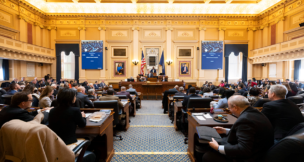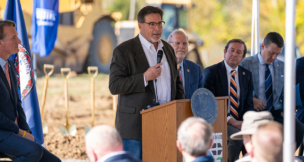Business groups ask Va. lawmakers for higher PPP tax deductions
House of Delegates, state Senate bills differ on amounts
Kate Andrews //February 17, 2021//
Business groups ask Va. lawmakers for higher PPP tax deductions
House of Delegates, state Senate bills differ on amounts
Kate Andrews //February 17, 2021//
Virginia’s two legislative bodies have not yet agreed on an amount that Virginia businesses can deduct from federal Paycheck Protection Program loans they received last year, and how much of the loans they’ll have to pay state taxes on. Business groups are asking state lawmakers to allow higher deductions — especially for sectors like hospitality and restaurants that are still suffering from the COVID-19 pandemic’s economic impacts.
In two bills currently going through the General Assembly, the Senate has approved a $100,000 deduction, while the House of Delegates has agreed to only a $25,000 deduction — requiring businesses that received PPP loans to pay state taxes on all funding above those amounts. The maximum loan amount allowed under the program was $10 million; approximately 114,000 small businesses in Virginia received a total of $12.6 billion in PPP loans last year (including Virginia Business Media LLC). In January, the U.S. Small Business Administration opened a second round of PPP loans capped at $2 million each.
In December 2020, Congress stipulated that all PPP funds would be exempt from federal corporate taxes and also allowed businesses to deduct expenses paid with PPP funds.
The two state bills, which would bring Virginia into conformity with the latest federal IRS code, will ultimately have to be reconciled before reaching the governor’s desk — and business groups know which way they want the decision to go: toward higher deduction rates.
In a letter to House Speaker Eileen Filler-Corn and Senate Majority Leader Dick Saslaw sent Wednesday, the Virginia Restaurant, Lodging and Travel Association says that both bills “unfairly limit tax deductions. PPP represented a temporary fix, which directly benefits Virginia’s fiscal outlook through reduced unemployment and lower Medicaid enrollment. But this legislation reverses this economic benefit by increasing state tax burdens when Virginia’s hospitality businesses can least afford it.”
VRLTA President Eric Terry notes in the letter that the state’s restaurant industry continued to lose jobs into December 2020, and the leisure and hospitality industry has lost more than 72,000 jobs statewide over the last year. He asks that legislators consider a higher deductible amount for hospitality businesses that were more adversely affected than other kinds of businesses, while voicing support for the Senate’s plan.
“As you consider legislation regarding tax conformity with federal standards, we ask that you take into consideration the exceptionally challenging situation of the hospitality industry,” Terry wrote. “The recent announcement of an additional $730 million in the mid-session budget re-forecast provides you with the ability to do more to help those in the hospitality industry which were most heavily impacted by COVID-19.
“Without action, our members will face surprise tax bills at a time when they should be focusing on surviving the winter and the pandemic. We ask that you consider creating a higher deductibility allowance for the hospitality industry to recognize the unique challenges our members continue to face.”
On Monday, Gov. Ralph Northam announced that state revenue is expected to be $730.2 million higher than expected for the next two years, jumping to $46.7 billion. In his statement, the governor said that the additional funds “allow us to move forward with our shared priorities — providing Virginia families and businesses the relief they need to get back on their feet, supporting public schools and giving our public workers a pay raise.”
The Virginia chapter of the National Federation of Independent Business released a statement Feb. 4 that praises the Senate’s recommended deduction of $100,000 and asks the House to reconsider its $25,000 limit.
“Small business owners were desperate when they took these federal loans after losing large amounts of revenue due to state-mandated shutdowns and restrictions,” NFIB State Director Nicole Riley said in a statement. “They followed all the rules set by Congress to keep their employees paid and off unemployment, so at the federal level the loans were forgiven and all related expenses were deductible. Now, almost a year later, when so many small businesses are still struggling to stay afloat, setting a higher cap on deductions will help them recover and prevent more business closures.”
Virginia is one of about 20 states that freeze conformity of state tax rules with federal tax code as of a particular date. Currently, Virginia’s state tax laws conform with pre-pandemic IRS code as it existed on Dec. 31, 2019.
l
















